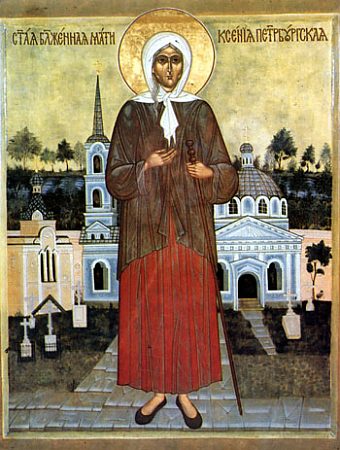St. Xenia of Petersburg, fool-for-Christ (18th c.)
Commemorated on January 24, May 24
She was born about 1730, and as a young woman married an army
colonel named Andrei, a handsome and dashing man fond of worldly living. When
she was twenty-six years old, her husband died suddenly after drinking with his
friends, leaving Xenia a childless widow. Soon afterward, she gave away all her
possessions and disappeared from St Petersburg for eight years; it is believed
that she spent the time in a hermitage, or even a monastery, learning the ways
of the spiritual life. When she returned to St Petersburg, she appeared to have
lost her reason: she dressed in her husband's army overcoat, and would only
answer to his name. She lived without a home, wandering the streets of the city,
mocked and abused by many. She accepted alms from charitable people, but
immediately gave them away to the poor: her only food came from meals that she
sometimes accepted from those she knew. At night she withdrew to a field outside
the city where she knelt in prayer until morning.
Slowly, the people of the city noticed signs of a holiness that underlay her
seemingly deranged life: she showed a gift of prophecy, and her very presence
almost always proved to be a blessing. The Synaxarion
says "The blessing of God seemed to accompany her wherever she went: when she
entered a shop the day's takings would be noticeably greater; when a cabman gave
her a lift he would get plenty of custom; when she embraced a sick child it
would soon get better. So compassion, before long, gave way to veneration, and
people generally came to regard her as the true guardian angel of the city."
Forty-five years after her husband's death, St Xenia reposed in peace at the
age of seventy-one, sometime around 1800. Her tomb immediately became a place of
pilgrimage: so many people took soil from the gravesite as a blessing that new
soil had to be supplied regularly; finally a stone slab was placed over the
grave, but this too was gradually chipped away by the faithful. Miracles,
healings and appearances of St Xenia occur to this day, to those who visit her
tomb or who simply ask her intercessions. Her prayers are invoked especially for
help in finding employment, a home, or a spouse (all of which she renounced in
her own life). A pious custom is to offer a Panachida / Trisagion Service for
the repose of her husband Andrei, for whom she prayed fervently throughout her
life.
Saint Xenia was first officially glorified by the Russian Orthodox Church
outside Russia in 1978; then by the Moscow Patriarchate in 1988.
